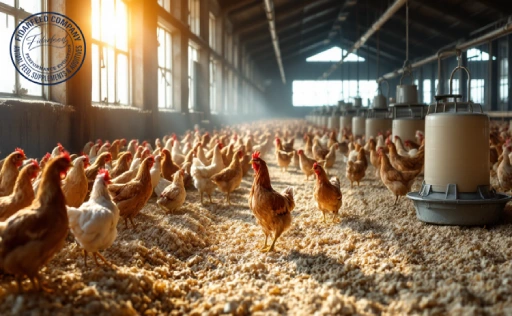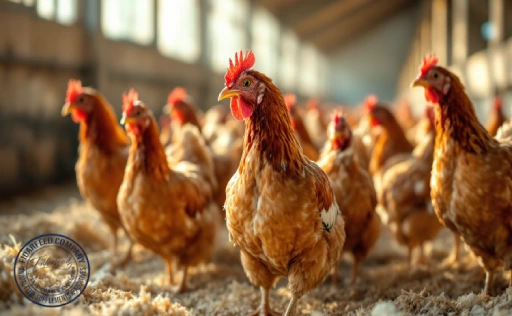Choosing the right broiler breed is one of the most crucial decisions any poultry farmer can make. Guide to Choosing the Best Broiler Breed: Cobb 700 vs Cobb 500 is designed to walk you through the key differences, advantages, and practical considerations of these two popular breeds. Whether you’re managing a small family-run farm or overseeing a large-scale commercial operation, understanding the nuances of Cobb 700 and Cobb 500 will help you make smarter, more profitable decisions. Let’s explore what truly sets these breeds apart—and which one could be the best fit for your goals.
Why Breed Selection Matters: Cobb 700 vs Cobb 500 in Focus
Broiler breed selection affects every part of your poultry production cycle—growth rate, feed cost, meat yield, adaptability, and ultimately, profit margins. A mismatch between the breed’s traits and your farm’s capacity can lead to reduced efficiency and increased losses.
Learn more about: Product
For example, if you’re aiming for fast market turnover and minimal labor input, your ideal breed may differ from someone focused on premium carcass quality and higher meat yields. Cobb 700 and Cobb 500 are both high-performing breeds, but each serves a slightly different purpose. Understanding their strengths helps you align your breed choice with your farm’s operational strategy.
Overview of Cobb 500: The Industry Standard for Efficiency
Cobb 500 has earned its place as a global standard for broiler efficiency. It’s often chosen by farmers looking for rapid growth with excellent feed conversion ratios (FCR). Cobb 500 broilers are known for reaching market weight quickly—typically around 2.2–2.5 kg live weight in 35 to 42 days, depending on management and environmental factors.
Learn more about: Cobb 500: The Broiler Breeder’s First Choice – Unveiled
Their feed efficiency is one of their strongest assets. In ideal conditions, they can achieve an FCR as low as 1.5–1.6, meaning they convert less feed into more body mass. This makes them particularly attractive to producers in regions where feed costs are high or availability is limited.
Moreover, Cobb 500 birds adapt well to a variety of farming systems, from intensive indoor environments to more semi-intensive operations. Their uniform growth and moderate breast meat yield make them a reliable choice for bulk meat production.
Understanding Cobb 700: Designed for Higher Yield and Robustness
If Cobb 500 is the king of efficiency, Cobb 700 is the champion of meat yield and resilience. Designed for high breast meat output and stronger performance under challenging conditions, Cobb 700 is often the breed of choice for farms targeting premium cuts or longer grow-out cycles.
These birds grow slightly slower than Cobb 500 but offer better carcass quality and a higher percentage of breast meat—something that processors and retailers value highly. Additionally, Cobb 700 tends to have stronger leg health and better resistance to environmental stressors like heat or variable housing conditions, which is crucial for farms operating in more rugged or unpredictable climates.
Learn more about: Broiler Chicken Health at Risk? Know the Signs of Dysentery
Their adaptability doesn’t compromise uniformity either. With proper nutrition and management, Cobb 700 broilers deliver consistent body conformation and processing characteristics, making them a preferred breed in specialized meat markets.
Head-to-Head Comparison: Cobb 700 vs Cobb 500 Performance Metrics
| Trait | Cobb 500 | Cobb 700 |
|---|---|---|
| Growth Rate | Faster (35–42 days to market) | Slightly Slower (42–47 days) |
| Feed Conversion Ratio | Lower (1.5–1.6 under optimal care) | Slightly higher (1.6–1.7) |
| Live Weight | 2.2–2.5 kg (standard market size) | 2.6–3.2 kg (suitable for larger birds) |
| Breast Meat Yield | Moderate | High |
| Adaptability | Good in intensive systems | Excellent in diverse environments |
| Robustness | Moderate | High |
This comparison shows that Cobb 500 is more efficient in short cycles, while Cobb 700 delivers better returns for markets prioritizing meat quality and resilience.
Which Breed Fits Your Farm Best? Practical Factors to Consider
When choosing between Cobb 700 and Cobb 500, think about the bigger picture:
-
Farm Scale: Small operations with limited labor may benefit more from the faster-growing, easy-to-manage Cobb 500.
-
Feed Costs and Availability: If feed is expensive or scarce, Cobb 500’s efficiency is a big advantage.
-
Market Requirements: Selling to high-end processors or retail buyers? Cobb 700’s superior carcass traits may fetch better prices.
-
Climate and Infrastructure: Cobb 700 handles temperature swings and stress better, making it suitable for farms without advanced climate control.
-
Production Goals: For quick turnover and frequent flock rotations, go with Cobb 500. For high-yield meat output or heavier birds, Cobb 700 is your bird.
Learn more about: how to breed broiler chickens
Always match the breed’s strengths to your farm’s actual conditions—not just the ideal ones.
Real-World Results: How Cobb 700 and Cobb 500 Perform on Farms
Many farms across various environments have tested both breeds in controlled and real-world conditions. One multi-cycle trial showed that Cobb 500 birds reached 2.4 kg in just 38 days with a feed intake of approximately 3.7 kg, while Cobb 700 took around 43 days to reach 2.9 kg, consuming about 4.6 kg of feed.
Although Cobb 500 had a better FCR, Cobb 700 yielded up to 6% more breast meat, which resulted in higher per-bird revenue in premium meat markets. Moreover, Cobb 700 experienced lower leg disorders and heat stress mortality, especially in open housing during warmer months.
Learn more about: Ross 308 vs. Cobb 500: Which Broiler Breed is Right for You?
These results suggest that while Cobb 500 may be ideal for high-volume production, Cobb 700 can outperform in specialized settings with targeted market channels and slightly extended grow-out times.
Cost vs. Return: Evaluating Profitability in Broiler Breed Choice
Profitability isn’t just about how fast a bird grows—it’s about net return. Here’s what you should factor in:
-
Chick Price: Cobb 700 chicks are sometimes more expensive than Cobb 500.
-
Feed Cost per kg Gain: Cobb 500 usually wins here due to better FCR.
-
Meat Quality Premium: Cobb 700 often commands a better price at processing due to its high breast meat percentage.
-
Mortality and Health Costs: Cobb 700’s stronger resilience may save money in terms of vet care and losses during heat waves or stress.
-
Labor and Infrastructure: Cobb 500’s shorter cycle means quicker turnover but more frequent clean-outs and restocking.
Learn more about: Mastering the Basics: A Comprehensive Broiler Breeder Management Guide
The right choice depends on your business model. If you’re targeting quick cash flow, Cobb 500 could maximize throughput. If you’re targeting premium yields or more stable flocks, Cobb 700 might offer greater long-term value.
Final Verdict: Choosing the Right Broiler Breed for Sustainable Success
There’s no universal “best” breed—only the best one for your specific farm goals. Cobb 500 excels in speed, feed efficiency, and simplicity, making it a favorite for high-volume, cost-sensitive operations. Cobb 700, on the other hand, stands out for meat yield, robustness, and overall carcass value, especially in environments with greater stress or for producers aiming at high-end markets.
As you weigh your options, remember: your breed choice sets the tone for everything that follows—from feed planning to marketing. Take time to assess your environment, infrastructure, market demands, and long-term strategy.
We hope this Guide to Choosing the Best Broiler Breed: Cobb 700 vs Cobb 500 has helped you better understand your options. If you have questions, insights, or would like to share your own farm experiences, feel free to leave a comment below. Your input matters—and it helps others in the industry grow stronger together.










